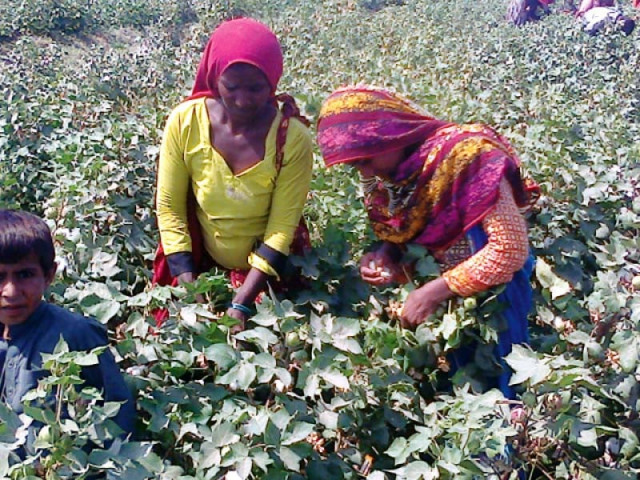Cotton market in crisis as intl prices drop
Analysts say govt’s fixed rate of Rs8,500 is causing ginners to shut down factories

The cotton market in Pakistan is currently facing a major disruption caused by the declining international price of cotton phutti. This downward trend in global prices is having far-reaching implications for the local market, exacerbating existing conflicts between the government and ginners and creating challenges for cotton growers. These issues are painting a bleak picture for Pakistan’s cotton sector.
The concerns about the global economic outlook have led to a significant decline in the price of cotton phutti in recent days, both internationally and locally.
Speaking to The Express Tribune, cotton analyst Naseem Usman highlighted the crisis in the cotton market, attributing it to government pressure to buy cotton at Rs8,500 per 40 kg. In response, cotton ginners have made the decision to shut down their factories. They are demanding that the government formulate a clear strategy to purchase cotton bales and oil at the government-set price, withdraw unjustified taxes on bales, and resolve electricity issues.
The Pakistan Cotton Ginners’ Association (PCGA) has expressed concern over the conflict between the government and ginners, stating that cotton growers and the cotton crop will be negatively affected. They have urged the government to intervene and take steps to protect the interests of cotton growers.
The government’s enforcement of the fixed rate of Rs8,500 for phutti purchases has caused further issues. As the international market consistently declines, the concerned deputy commissioners (DCs) and commissioners have been sealing factories that fail to offer the support price. Market stakeholders argue that the government should bear the difference if the current market rate is lower, encouraging ginners to continue their activities without incurring losses. However, the government has not responded to this issue and is instead sealing factories.
The challenging international prices of cotton have made it difficult for local farmers to obtain fair prices, according to Muhammad Ali Iqbal, President of Concave Agri Services. Additionally, the liquidity crunch faced by textile manufacturers has made it challenging for them to purchase cotton from farmers, while ginners have halted processing due to issues with the Central Cotton Institute.
Cotton growers, who have already faced significant challenges due to last year’s floods and this year’s adverse weather conditions, are now experiencing further hardship. The government has failed to ensure that buyers pay at least the defined support prices.
The current rate of cotton stands at around Rs7,800 per kg, with good quality cotton resulting from favourable weather conditions and the government’s efforts to combat fake pesticides, according to agricultural-based farmer Hamid Malik from Punjab. Although the minimum support price is set at Rs8,500, it is anticipated that the government’s intervention through the Trading Corporation of Pakistan (TCP) will be limited. The recovery of phutti is higher, contributing to good mill recovery. Despite these challenges, millers and exporters are still actively involved in purchasing cotton and showing interest in export activities. The estimated production for this year stands at 9.5 to 10 million bales.
The uncertainty surrounding the exchange rate is also a concern for cotton exporters, as fluctuations in the exchange rate significantly impact export activities.
Agriculturist Mahmood Nawaz Shah expresses concerns about the lack of government interest and the prevailing low rates in the market. While the government set a minimum support price of Rs8,500, growers had proposed a rate of Rs10,000. However, the current rates have dropped from Rs9,500 to Rs7,000, with ginners deducting additional weight. This has resulted in growers selling at a loss, as the cost of production has increased continuously. He also highlights the government’s lack of attention to this critical issue, despite the substantial amount spent on imports.
Cotton is a highly vulnerable crop that is susceptible to seasonal variations and severe pest attacks. As a result, nearly 70% of Sindh’s cotton crop has been affected. Shah emphasises that despite these risks, growers continue to produce without adequate support.
Published in The Express Tribune, July 16th, 2023.
Like Business on Facebook, follow @TribuneBiz on Twitter to stay informed and join in the conversation.



















COMMENTS
Comments are moderated and generally will be posted if they are on-topic and not abusive.
For more information, please see our Comments FAQ